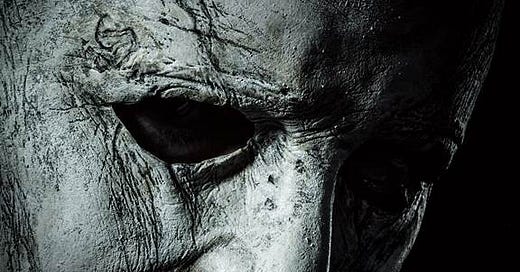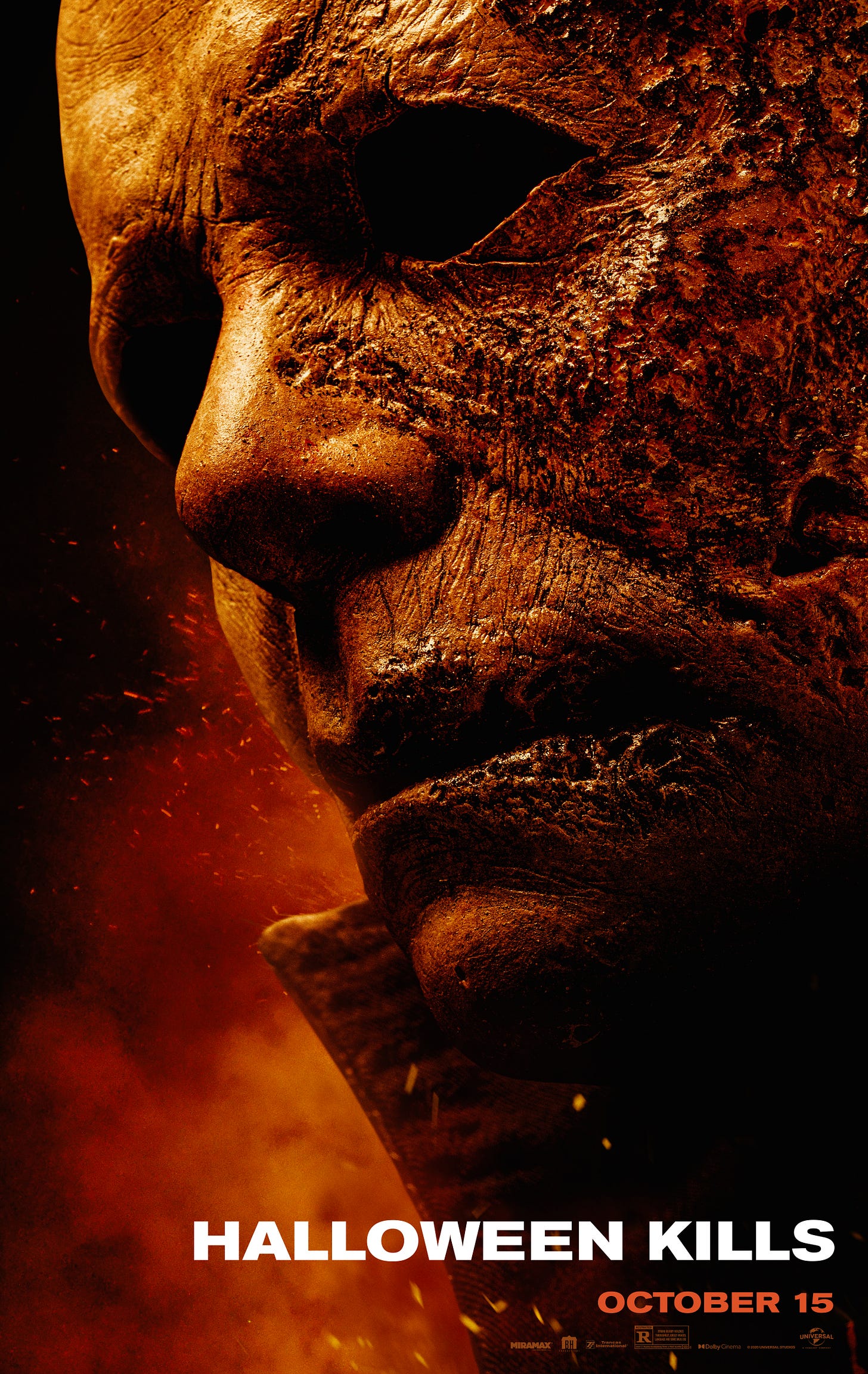We’ve finally arrived at the most recent entries in the Halloween franchise. While Rob Zombie’s Halloween wasn’t a critical success, it was certainly a financial success. It made $80.4 million on a $15 million budget, thus it was always going to get a sequel. Rob Zombie’s Halloween II in 2009 was significantly less successful. It brought in only $39.4 million on a $15 million budget, and both critical and fan reception was demonstrably worse than its predecessor. That response spelled the death of Zombie’s remake franchise, and the Halloween franchise in general faded away. We wouldn’t receive a new entry until 2018 (forty years after the release of the original) with David Gordon Green’s Halloween. It would end up being the first entry in a new trilogy.
Halloween (2018)
The first entry in this new trilogy had a very clear mission statement: return the franchise to its roots. David Gordon Green, Danny McBride, and Jeff Fradley (all known primarily for comedy at this point in their careers) wrote the script with Green taking the helm as director. It also brought back Jamie Lee Curtis as Laurie Strode.
Simply titled Halloween, the film functions as a direct sequel to the 1978 original. It cuts out all of the other sequels and remakes in an attempt to simplify and streamline the narrative. Laurie is no longer Michael’s sister, there are no cults or rituals, and (most importantly in my estimation) there is no obvious motive for Michael’s murderous actions. He is truly The Shape once again. He’s a silent being of pure evil killing his way through the town of Haddonfield and bringing to the surface the trauma that this small town (and Laurie in particular) has endured dating back to 1978.
If it isn’t clear, I love this movie. It is easily my favorite entry in the franchise since the original. It’s well acted, the scares are very well crafted (Michael’s return to Haddonfield on Halloween night filmed as one long continuous take is especially impressive), and it makes Michael Myers (played by James Jude Courtney) scary again in a way we haven’t seen since the original. It also works as a standalone sequel to the original. There is certainly room for additional sequels (which we got), but it can also be viewed as a satisfying conclusion to both Michael and Laurie’s stories.
I am not alone in my praise for this film. It is far and away the best reviewed Halloween movie since the original, and it made a staggering $259.9 million at the box office on a budget of only $10 million. There was no way it wouldn’t get a sequel after bringing in that kind of money.
Halloween Kills (2021)
That sequel would arrive three years later with Halloween Kills. Once again directed by David Gordon Green and written by Green, Danny McBride, and Scott Teems, the original plan was to make two films back-to-back. They would film both Halloween and its sequel at the same time and release them in consecutive years. Blumhouse reportedly nixed this idea and wanted to wait to see how the first film would perform before green lighting a sequel. When the first film became a massive success, Blumhouse green lit two sequels to form a trilogy. Green initially wanted to film both sequels simultaneously, but this was ultimately abandoned due to the amount of time needed to make the film.
Halloween Kills pays homage to some of the Halloween sequels of the past. The movie takes place on the same night as the previous film much like how Halloween II (1981) took place on the same night as the original. In another parallel with Halloween II, Laurie spends the majority of the film in the hospital as Michael continues his killing spree. In a nod to Halloween III: Season of the Witch (1982), three children in the film are wearing the Silver Shamrock masks from that film. Lastly, the film pays homage to Halloween 4: The Return of Michael Myers (1988) by including a subplot about an angry mob of vigilantes trying to hunt down and kill Michael with disastrous consequences.
The other aspect of this film that is similar to Halloween II is its framing of Michael compared with its predecessor. He is significantly more brutal and seemingly superhuman. No longer content with silently stalking babysitters, this Michael (once again played by Courtney) is a one man army of death. He tears through a group of firefighters without breaking a sweat, he terrorizes a car full of grown adults, and he slashed his way through a group of armed vigilantes. The kills themselves are also especially sadistic. We actually get to see him create his spooky little vignettes with the corpses of his victims in this one.
While Halloween Kills did not receive the same positive reception from critics and fans as the previous film, it still had a respectable showing at the box office. It made $133.4 million on a $20 million budget despite being released simultaneously on streaming due to the COVID pandemic. It’s easy to imagine that it would have made significantly more had it been a normal release.
I also admit to being a huge defender of this movie. It has a lot of problems, but I find it to still be extremely entertaining. Watching Michael Myers become an unstoppable force of death and embracing more of his supernatural elements is just something I personally enjoy. The heavy handed messaging and occasional cringe inducing dialogue can be frustrating, but they don’t take away from my overall enjoyment of the film. My biggest criticism is that it does not have a satisfying conclusion. It ends on a cliffhanger to set up the final entry in the trilogy, so part of the enjoyment of the film is tied to how well its sequel wraps up the dangling plot threads.
Halloween Ends (2022)
That brings us to the final chapter of this most recent trilogy. It’s once again directed by Green with Green, McBride, Paul Brad Logan, and Chris Bernier credited as the writers. I feel pretty comfortable declaring this film to be the most polarizing of the trilogy.
Halloween Ends is primarily set four years after the events of the previous two films. That poses a problem right off the bat as Halloween Kills ends on a massive cliffhanger. All of the death and mayhem wrought by Michael Myers on Halloween night has apparently been just one terrible event as Michael simply disappeared afterwards and has not been seen in the intervening four years. It’s an odd premise from the start. This unstoppable killing machine who seemingly cannot satiate his bloodlust just disappeared? He was never apprehended or believed to have been killed? Then why did he stop? It’s implied in the film that he has been lurking on the periphery of Haddonfield and picking off the occasional person, but it’s a far cry from his typical modus operandi. Regardless of why he has mostly vanished from the spotlight, the main consequence is that Michael isn’t the primary antagonist of this film. He’s more or less just a specter haunting the town.
That antagonist (and arguably protagonist) is a new character named Corey Cunningham played by Rohan Campbell. Corey is an outcast in Haddonfield due to a tragic accident that occurred while he was babysitting on Halloween night in 2019. He starts off as a sympathetic figure who is bullied and tormented by others in the town before a chance encounter with Michael Myers leads to him becoming the new masked boogeyman of Haddonfield. The film does eventually circle back around to Michael Myers for one last showdown with Laurie Strode at the very end of the film, but it isn’t the primary focus.
As you can probably tell, I’m not a huge fan of this film. That is primarily due to its focus on the Corey character as opposed to any previously established characters. I don’t necessarily think subversion of expectations is a bad thing in and of itself, but doing so at the expense of Laurie Strode and Michael Myers’s stories is a big misstep for the final chapter in a trilogy. I think this idea would have worked much better as the second chapter in a trilogy. Having Michael go missing in action following the events of the 2018 film, introducing Corey as his heir apparent in the second chapter, and then having Michael’s glorious return in the final film in the trilogy would have worked much better thematically in my humble opinion.
The film isn’t completely without merit. The opening sequence in particular is really well done. There are also some really effective scares and kills in the latter half of the movie. Unfortunately, the first half really drags as it takes a while to find its footing. The climactic showdown between Laurie and Michael also feels rushed and a bit out of place.
The film also wasn’t as financially successful as the previous two installments. The budget ballooned to $33 million (likely due in part to the struggles of filming during the COVID pandemic), and it only made $105.4 million at the box office. It was still a success, but it was a clear case of diminishing returns. The film rights to the franchise have since been acquired by Miramax, so any future films will likely not be connected to this trilogy produced by Blumhouse.
Overall, I think Green’s trilogy is still a net positive for the franchise. One of the best contributions this trilogy has made is reestablishing Michael Myers as truly scary. A lot of that is due to Courtney’s performance. The fluidity of motion combined with his stature brings an intimidating aura to the character. On top of that, these films have what is easily the best and scariest looking mask since the original thanks to visual effects artist Christopher Nelson.
This trilogy also features the return of John Carpenter to the franchise as the composer (along with his son Cody) for the score of all three films. All three are fantastic, and they serve as an excellent reminder that he is one of the great composers of our time.
Lastly, this trilogy really allows Jamie Lee Curtis to shine as Laurie Strode. The woman who has become synonymous with the “final girl” trope was given the opportunity to show that she is so much more than that as an actor. These three films are a great sendoff for her most iconic character.
I’ll be curious to see what Miramax does with the newly acquired film rights to the franchise. They reportedly plan on developing a Halloween television series. Rest assured that I will be covering it if and when it debuts.






